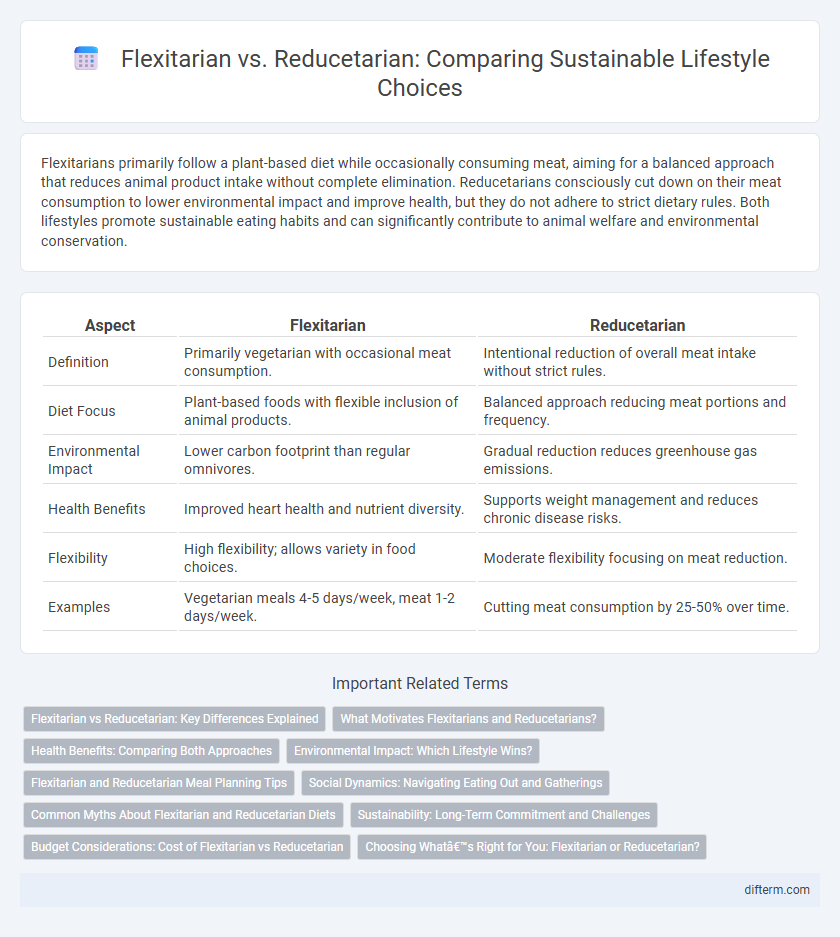Flexitarians primarily follow a plant-based diet while occasionally consuming meat, aiming for a balanced approach that reduces animal product intake without complete elimination. Reducetarians consciously cut down on their meat consumption to lower environmental impact and improve health, but they do not adhere to strict dietary rules. Both lifestyles promote sustainable eating habits and can significantly contribute to animal welfare and environmental conservation.
Table of Comparison
| Aspect | Flexitarian | Reducetarian |
|---|---|---|
| Definition | Primarily vegetarian with occasional meat consumption. | Intentional reduction of overall meat intake without strict rules. |
| Diet Focus | Plant-based foods with flexible inclusion of animal products. | Balanced approach reducing meat portions and frequency. |
| Environmental Impact | Lower carbon footprint than regular omnivores. | Gradual reduction reduces greenhouse gas emissions. |
| Health Benefits | Improved heart health and nutrient diversity. | Supports weight management and reduces chronic disease risks. |
| Flexibility | High flexibility; allows variety in food choices. | Moderate flexibility focusing on meat reduction. |
| Examples | Vegetarian meals 4-5 days/week, meat 1-2 days/week. | Cutting meat consumption by 25-50% over time. |
Flexitarian vs Reducetarian: Key Differences Explained
Flexitarian diets emphasize primarily plant-based foods while allowing occasional meat and animal products, promoting flexibility and balanced nutrition. Reducetarianism focuses on consistently reducing overall meat consumption without strict elimination, aiming for gradual dietary change. Both approaches contribute to sustainability and health improvement but differ in commitment level and dietary flexibility.
What Motivates Flexitarians and Reducetarians?
Flexitarians are motivated by a desire to improve health, reduce environmental impact, and enjoy greater dietary flexibility by occasionally eating meat. Reducetarians focus on significantly lowering meat consumption to promote sustainability, animal welfare, and personal well-being without fully eliminating animal products. Both groups share a commitment to mindful eating habits that balance nutrition and ethical considerations.
Health Benefits: Comparing Both Approaches
Flexitarian diets emphasize mostly plant-based foods while allowing occasional meat consumption, promoting heart health through increased fiber intake and reduced saturated fats. Reducetarianism focuses on consciously lowering overall meat consumption, reducing risks of chronic diseases by minimizing processed meat and boosting antioxidant-rich fruits and vegetables. Both approaches support weight management, improve digestion, and contribute to lowering the incidence of diabetes and hypertension.
Environmental Impact: Which Lifestyle Wins?
Flexitarian and reducetarian diets both prioritize reducing meat consumption to lower environmental impact, with flexitarians occasionally eating meat and reducetarians cutting back more selectively. Studies indicate that adopting a flexitarian diet can reduce greenhouse gas emissions by up to 50% compared to a traditional meat-based diet, while reducetarians achieve similar reductions depending on their level of meat reduction. Overall, the flexitarian lifestyle is often considered more sustainable due to its balanced approach that encourages plant-based foods without complete meat elimination.
Flexitarian and Reducetarian Meal Planning Tips
Flexitarian meal planning emphasizes incorporating more plant-based proteins such as legumes, tofu, and whole grains while allowing occasional meat or fish, promoting nutrient diversity and sustainability. Reducetarian strategies focus on gradually decreasing meat portions by substituting vegetable-rich dishes and exploring seasonal produce to maintain flavor and reduce environmental impact. Both approaches benefit from preparing balanced meals with a variety of colors, textures, and nutrients to support a flexible, health-conscious lifestyle.
Social Dynamics: Navigating Eating Out and Gatherings
Flexitarians and reducetarians often face distinct social dynamics when dining out or attending gatherings, balancing personal dietary choices with group preferences. Flexitarians typically integrate more plant-based options while occasionally consuming meat, easing social interactions by offering flexible menu choices. Reducetarians prioritize reducing meat intake, which may require proactive communication and planning to accommodate their preferences in social settings without causing discomfort.
Common Myths About Flexitarian and Reducetarian Diets
Flexitarian and reducetarian diets are often misunderstood as being synonymous with complete vegetarianism or veganism, which is inaccurate since both focus on flexible food choices and gradual reduction of animal products. Common myths claim these diets lack protein or essential nutrients, yet research shows they offer balanced intake with diversified plant and animal sources. Many also falsely believe flexitarian and reducetarian approaches are difficult to sustain, while studies highlight their practicality and benefits for long-term health and environmental impact.
Sustainability: Long-Term Commitment and Challenges
Flexitarians adopt a flexible plant-based diet, balancing occasional animal products with sustainability goals, whereas reducetarians commit to consistently reducing meat consumption to lower environmental impact. Both lifestyles contribute to decreased greenhouse gas emissions and resource use but face challenges such as social acceptance, nutritional planning, and long-term adherence. Sustained commitment requires education on ecological footprints, access to diverse plant-based options, and addressing cultural food norms to ensure meaningful environmental benefits.
Budget Considerations: Cost of Flexitarian vs Reducetarian
Flexitarian diets often involve occasional plant-based meals combined with moderate animal product consumption, potentially increasing grocery costs due to diversified ingredient needs. Reducetarian diets focus on reducing overall meat intake without strict elimination, which typically lowers food expenses by emphasizing more affordable plant-based staples. Budget-conscious individuals may find reducetarianism more cost-effective, as it encourages gradual meat reduction and maximizes budget-friendly plant foods.
Choosing What’s Right for You: Flexitarian or Reducetarian?
Choosing between a flexitarian and reducetarian lifestyle depends on your personal dietary goals and environmental values. Flexitarians primarily follow a plant-based diet but occasionally consume meat, emphasizing flexibility and gradual change. Reducetarians focus on significantly lowering meat intake to improve health and reduce ecological impact without strict rules, allowing for customizable and sustainable eating habits.
Flexitarian vs Reducetarian Infographic

 difterm.com
difterm.com